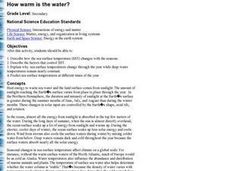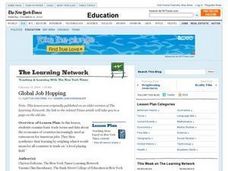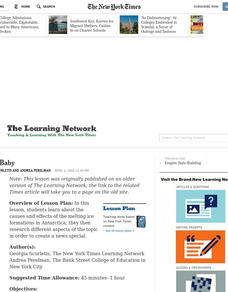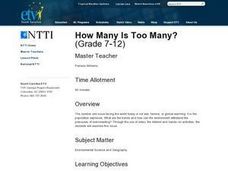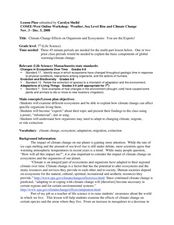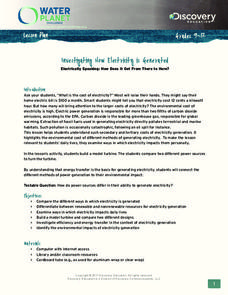Curated OER
Iron Fertilization - Pumping Iron
The theory that adding iron to ocean water may increase phytoplankton ability to remove carbon dioxide from the atmosphere is examined. The Monterey Bay Aquarium Research Institute is monitoring conditions off the California coast to...
Curated OER
How Warm is the Water?
Pupils research how surface sea temperature changes throughout the year. They draw a time series of sea surface temperatures for each month of the year and a depth profile for a summer and winter month using an OceanExplorer Profiler tool.
Curated OER
Global Job Hopping
Students examine basic trade terms and data about the economies of countries increasingly used as outsources for American jobs.
Curated OER
Loss of Wetlands: Subsidence
Students observe subsidence and the effect it has on wetlands with a classroom demonstration. They think about the impact of global warming and the sea level and how it affects the marsh.
Teach Engineering
Introduction to Water Chemistry
What are the issues surrounding water quality? Viewers of this short presentation gain information about the importance of clean water, the lack of fresh water, water contamination, and ways that engineers treat water.
Curated OER
Korean Foods
An interesting lesson to find more information about the subject of Korean foods and their origins in culture. The topics surrounding mealtime, such as religious traditions and etiquette are researched in order to put together a key note...
Curated OER
The Energy Debate - Sea Level Rise
Students comprehend the impact of global warming on our coastal cities. They appreciate how geographic information systems can be used to represent scientific data. Students research the melting of the ice caps in Antarctica and the Arctic.
Curated OER
Why is the Average Temperature Greater on Venus than on Mercury?
Students examine the reasons why the temperature is higher on Venus than on Mercury. In groups, they analzye both planet's atmospheres and determine the rate of global warming on each. They use the internet to research the planets in...
Curated OER
Atmospheric Pressures
Students research past, present and proposed climate change policies. They develop timelines based on different predictions of climate change effects and assess the likelihood of each timeline playing out in reality.
Curated OER
Climate Change
Ninth graders compare the Arctic and Antarctic. In this climate lesson students work in groups, research and complete an oral report or a poster.
Curated OER
Water Everywhere: Is There Enough to Drink?
Students examine water supply issues caused by population growth and land use. They read and discuss an article, develop a water usage trivia game, write a news article, illustrate a desalination process, and research aquifer systems.
Curated OER
Weather
Students recognize that carbon dioxide's role in the greenhouse effect. They research the greenhouse effect to design and create a greenhouse structure to measure the changing temperatures over a 24-hour period. In addition, they write a...
Curated OER
Canada's Arctic Barometer
Students research arctic climates. In this Web-quest investigation, students will identify Arctic climate changes, explain the effects of these changes, relate the changes to other regions, and write their findings in a letter format.
Curated OER
Ice, Ice, Baby
Students explore the causes and effects of the melting ice formations in Antarctica; they then research different aspects of the topic in order to create a news special.
Curated OER
Scientists Create Energy-Making Artificial Leaf (29th March, 2011)
Students read an article about alternative energy and complete the associated worksheets. In this ESL/ELL alternative energy instructional activity, students read or listen an article about research at MIT in which scientists designed a...
Curated OER
How Many Is Too Many?
Students explore the population explosion. They view a video depicting the exponential growth of human population. Students research the internet to project future population data. They perform hands-on, multimedia activities to study...
Curated OER
Climate Change Effects on Organisms and Ecosystems: You are the Experts!
Seventh graders research about the effect of climate on different ecosystems. In this life science lesson, 7th graders present their research by creating a poster, infomercial, skit or song. They discuss how organisms adapt to climate...
Curated OER
SAVE OUR EARTH
Students research current environmental problems in order to develop and deliver an oral presentation. The presentation persuades the audience to act on the student's point of view on the issue.
Curated OER
Risks and Benefits
Students research and discuss the risks and benefits of cell phones and driving. They analyze the mechanical and administrative causes of the accident of the Space Shuttle Challenger. They write an essay explaining the risks and benefits...
Curated OER
The Future of Arctic Sea Ice
Learners research about the importance of sea ice to world climate and sea organisms. In this earth science lesson, students create a model of present and future Arctic sea ice communities. They discuss how ice melting affects...
UAF Geophysical Institute
Carbon Footprint
Your young environmentalists can calculate their carbon footprint and discuss ways to reduce it with a worksheet about climate change. After reading a handout about what impact one's carbon footprint can have on the environment, kids...
Curated OER
Trade Secrets
Young analysists explore how global trade and free market policies might personally affect them. They read an article, view a series of documenteries, and engage in a class discussion. Great lesson!
EarthEcho International
Investigating How Electricity is Generated
What is the real cost of electricity? The real cost is not just the price you pay, but the environmental and economic costs as well. Scholars build, use, and judge the effectiveness of a turbine. They also investigate the environmental...
NOAA
Marine Policy
Save the oceans! The 22nd installment of a 23-part NOAA Enrichment in Marine sciences and Oceanography (NEMO) program focuses on laws and marine policy. Pupils take part in an activity investigating fisheries stock data.



